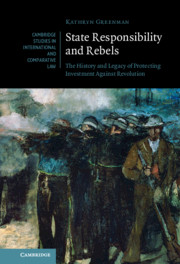Book contents
- State Responsibility and Rebels
- Cambridge Studies in International and Comparative Law
- State Responsibility and Rebels
- Copyright page
- Contents
- Acknowledgements
- Table of Cases
- 1 The Past and Present of State Responsibility for Rebels
- 2 The System: Mixed Claims Commissions in the Shadow of Empire
- 3 The Cases: Autonomy, Ambiguity and Doctrine in the Work of the Commissions
- 4 The Scholarship: Resistance and Development
- 5 The Codification Projects: Stalemate
- 6 The Legacy: Protecting Investment against Revolution in the Decolonised World
- Bibliography
- Index
- Cambridge Studies in International and Comparative Law
3 - The Cases: Autonomy, Ambiguity and Doctrine in the Work of the Commissions
Published online by Cambridge University Press: 13 August 2021
- State Responsibility and Rebels
- Cambridge Studies in International and Comparative Law
- State Responsibility and Rebels
- Copyright page
- Contents
- Acknowledgements
- Table of Cases
- 1 The Past and Present of State Responsibility for Rebels
- 2 The System: Mixed Claims Commissions in the Shadow of Empire
- 3 The Cases: Autonomy, Ambiguity and Doctrine in the Work of the Commissions
- 4 The Scholarship: Resistance and Development
- 5 The Codification Projects: Stalemate
- 6 The Legacy: Protecting Investment against Revolution in the Decolonised World
- Bibliography
- Index
- Cambridge Studies in International and Comparative Law
Summary
The mixed claims commissions, which had a degree of autonomy from the agendas of the states that imposed them, produced a rich and extensive body of case law on state responsibility for rebels. The practice of the commissions to enforce claims based in contract greatly increased the scope of state responsibility for rebels, in a way that reduced the risks for foreign nationals of doing business in Latin America and insulated commercial relations from political instability; the arbitral practice had a politics, even if it did not necessarily or straightforwardly reflect the context of the commissions’ establishment. The commissions engaged with a number of important international legal rules and principles: the general principle of non-responsibility for rebels, with exceptions for successful rebels, rebels who establish de facto authority and negligence in failing to protect against rebels. The exceptions to non-responsibility, particularly the duty of protection, would end up being more important than the rule. At the same time, the practice of the commissions was at times contradictory and ambiguous, providing only the shakiest foundation for future obligations.
Keywords
- Type
- Chapter
- Information
- State Responsibility and RebelsThe History and Legacy of Protecting Investment Against Revolution, pp. 69 - 108Publisher: Cambridge University PressPrint publication year: 2021



